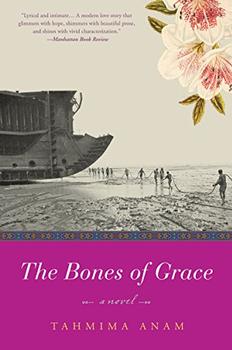Page 1 of 1
There is 1 reader review for The Bones of Grace
Write your own review!
 Cloggie Downunder
A brilliant read.
Cloggie Downunder
A brilliant read.
“You realise, don’t you, Elijah, that this is the way you worked your way into my heart? Not just in those days together in Cambridge, but in the aftermath, when I couldn’t stop talking about you, when every turn of my story included a footnote of conversation as I pictured how you might respond, the way the desert light would catch your hair, the effect of the parched, history-heavy air on your voice. What would you have made of all this, the green flags of our tents on the lunar surface of this ancient place, our little argument with time”
The Bones of Grace is the final book in the loosely connected Bengal trilogy by British Bangladeshi writer, novelist and columnist, Tahmima Anam. Zubaida Haque is writing to the man she fell in love with one Cambridge afternoon at a Shostakovich Preludes concert. Elijah Strong is not the man she married, but Zubaida is writing to explain what led to her the actions that she knows broke his heart.
The story she tells, parts of which he of course knows well, details their first meeting, just days before she departed for an archaeological dig in Pakistan. As a palaeontologist, Zubaida has been selected to help unearth the bones of the “walking whale”, Ambulocetus, near a remote village. But events conspire to put her back in her hometown, Dhaka, much sooner than expected, and she finds the pressure to enter into the expected marriage, too much to resist.
Anam’s extensive research into many topics is apparent on every page and she manages to include a myriad of interesting subjects in her narrative: as well as the evolution of the whale and archaeology digs, she explores the industry of ship-breaking, the plight of ex-pat construction workers in Dubai, undocumented adoption and the search for a birth mother, and for a long-lost lover. She weaves a wealth of curious facts into a plot that itself is mesmerising, and does so with some gorgeous descriptive prose.
“The light came in as we waited, and then there it was, a sliver on the horizon. We watched as it grew. More of the men arrived, wiping the sleep from their eyes. The curve of the ship began to appear, and now we could see the gleam of the hull, a poem of curves rising out of the remnants of dark, and suddenly it was before us, as if it had turned a sharp corner, white, immense, violent” and “She is a person with guilt at the very core of her being, and she spends her days compensating others for the fortune that brought her a life, a marriage, me. She is a moral economy all to herself, painted in tiny strokes of the past” are examples.
Anam’s characters are multifaceted, all have flaws, and the reader cannot help but care about their fate. While this novel is part of a trilogy, it can easily be read as a stand-alone, but readers are likely to want to seek out the earlier books by this talented author. A brilliant read.
